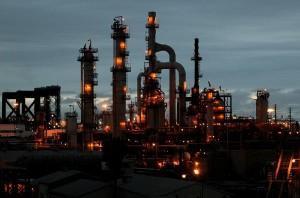
Valero refinery in Wilmington
by Jack Eidt / WildUtopia.com
Valero Energy seeks permits for large-scale shipments of low-quality tar sands oil via rail into their Port of Los Angeles refinery, without any public comment or environmental review. As part of a larger move to transport climate-disrupting unconventional crude to ports for refining and export to the world, it presents dangers given recent rail accidents, the corrosive nature of tar sands bitumen, and the significant pollution that surrounding communities already live with.
Valero Energy Corp intends to construct a 50-car rail unloading system to import 60,000 barrels of tar sands diluted bitumen (dilbit) per day into their Ultramar Wilmington Refinery in the Harbor Area of LA. This proposal would potentially exchange more than 76% of its refinery input from conventional crude to dilbit. A coalition of climate, environmental and social justice activists led by Tar Sands Action SoCal, has demanded that AQMD conduct an open and transparent process on the Valero project, with public participation in an environmental review process.
Los Angeles communities experience higher rates of asthma, because they breathe some of the most polluted air in the country. Of particular concern is the low-income community of Wilmington, an LA Harbor suburb surrounded by five oil refineries and long decried by social justice groups as a “sacrifice zone” of commerce and toxic pollution. Many studies have found that refining dilbit releases into the air greater concentrations of pollutants such assulfur dioxide, various heavy metals, and other harmful pollutants.
In addition to Valero, Phillips 66 Co. and Tesoro Corp also have announced plans to use rail cars to bring in more Canadian tar sands, with as yet no public process to evaluate the impacts of this move.

A tar sand mine in northern so called Alberta

